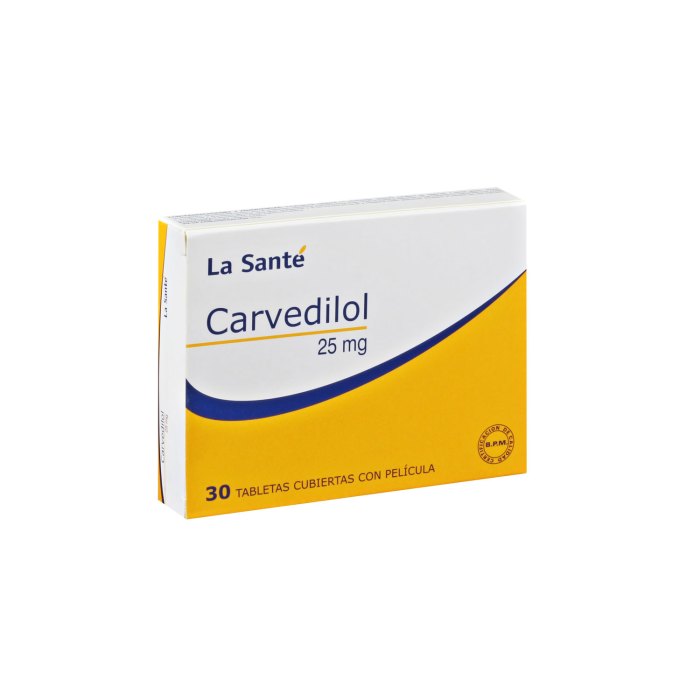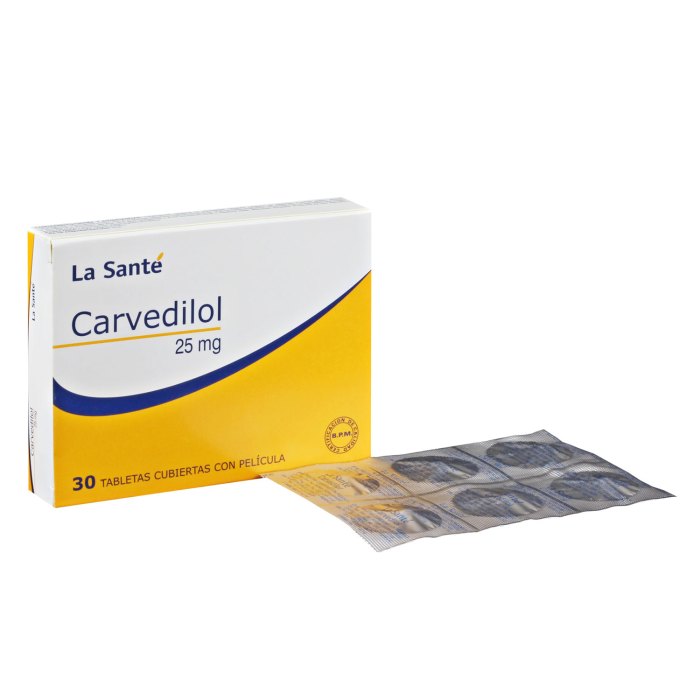Carvedilol, a medication known for its dual beta-blocker and vasodilator properties, plays a significant role in managing various cardiovascular conditions. Its unique mechanism of action allows it to effectively target multiple aspects of heart health, making it a valuable tool for physicians and patients alike.
This comprehensive overview delves into the intricacies of carvedilol, exploring its pharmacological profile, clinical applications, adverse effects, and future research directions. We will examine its role in treating hypertension, heart failure, and preventing cardiovascular events, highlighting its impact on patient quality of life.
Carvedilol in the Prevention of Cardiovascular Events

Carvedilol, a non-selective beta-blocker with vasodilatory properties, has demonstrated potential in preventing cardiovascular events, particularly in individuals with established heart disease. Its ability to reduce mortality and morbidity in these patients has led to its widespread use.
Mechanisms of Cardiovascular Protection
Carvedilol’s protective effects on the cardiovascular system stem from a combination of mechanisms:
* Beta-blockade: Carvedilol blocks the effects of catecholamines (such as adrenaline and noradrenaline) on beta-adrenergic receptors, leading to reduced heart rate, contractility, and blood pressure. This helps to decrease the workload on the heart and reduce the risk of arrhythmias.
* Vasodilation: Carvedilol’s vasodilatory properties, mediated through its action on vascular smooth muscle, contribute to improved blood flow and reduced peripheral vascular resistance. This helps to lower blood pressure and improve oxygen delivery to the heart.
* Antioxidant and Anti-inflammatory Effects: Carvedilol exhibits antioxidant and anti-inflammatory properties, which may contribute to its cardioprotective effects. It helps to protect against oxidative stress and inflammation, both of which play a role in the development of cardiovascular disease.
Clinical Trials Investigating Carvedilol’s Effects on Cardiovascular Event Rates
Several clinical trials have investigated the effects of carvedilol on cardiovascular event rates in patients with various cardiovascular conditions. Some notable examples include:
* The CAPRICORN (Carvedilol Post-Infarction Survival Control in Left Ventricular Dysfunction) trial: This landmark trial demonstrated that carvedilol significantly reduced mortality and the risk of heart failure in patients with left ventricular dysfunction following myocardial infarction.
* The CIBIS-II (Carvedilol in Stable Chronic Heart Failure) trial: This trial showed that carvedilol improved survival and reduced the risk of hospitalization in patients with stable chronic heart failure.
* The COPERNICUS (Carvedilol Prospective Randomized Cumulative Survival Study) trial: This trial demonstrated that carvedilol significantly reduced mortality and the risk of cardiovascular events in patients with stable coronary artery disease.
These clinical trials provide compelling evidence that carvedilol can effectively reduce the risk of cardiovascular events in patients with various heart conditions. Its combination of beta-blocking, vasodilatory, antioxidant, and anti-inflammatory effects contribute to its cardioprotective properties.
Carvedilol and its Impact on Quality of Life
Carvedilol, a beta-blocker with vasodilatory properties, is widely used in the management of various cardiovascular conditions. While its efficacy in reducing cardiovascular events is well-established, its impact on patient quality of life is also crucial to consider. This section explores the potential effects of carvedilol on patient quality of life, encompassing physical function, emotional well-being, and social activities. It also delves into how the adverse effects of carvedilol might influence quality of life, and provides examples of studies that assessed the impact of carvedilol on patient-reported outcomes.
Impact on Physical Function
Carvedilol’s effects on physical function can be both positive and negative. On the positive side, carvedilol can improve exercise tolerance and reduce fatigue by improving heart function and reducing blood pressure. This can lead to increased physical activity and improved overall well-being.
On the other hand, some patients may experience side effects such as fatigue, dizziness, or shortness of breath, which can negatively impact their physical function and limit their ability to engage in daily activities.
Impact on Emotional Well-Being
Carvedilol’s impact on emotional well-being is complex. While it can improve mood and reduce anxiety in some patients by reducing cardiovascular symptoms, it can also cause mood changes, depression, or insomnia in others.
Impact on Social Activities
Carvedilol’s influence on social activities can be multifaceted. Patients who experience improved physical function and reduced fatigue may be more likely to participate in social activities. Conversely, those experiencing side effects such as dizziness or fatigue may find it challenging to engage in social activities.
Adverse Effects and Quality of Life
The adverse effects of carvedilol can significantly influence quality of life. Common side effects include fatigue, dizziness, diarrhea, and bradycardia. These effects can impact physical function, emotional well-being, and social activities, leading to decreased quality of life.
Studies on Carvedilol and Patient-Reported Outcomes
Several studies have assessed the impact of carvedilol on patient-reported outcomes.
One study published in the *Journal of the American College of Cardiology* evaluated the impact of carvedilol on health-related quality of life in patients with heart failure. The study found that carvedilol was associated with significant improvements in physical function, emotional well-being, and overall quality of life.
Another study published in the *European Heart Journal* assessed the impact of carvedilol on patient-reported outcomes in patients with hypertension. The study found that carvedilol was associated with improvements in physical function, emotional well-being, and social activities.
Future Directions in Carvedilol Research

Carvedilol, a non-selective beta-blocker with vasodilatory properties, has established itself as a valuable therapeutic agent for cardiovascular diseases. However, ongoing research continues to explore its potential for new applications and refine its use. These efforts are driven by a desire to further understand carvedilol’s mechanisms of action, optimize its therapeutic benefits, and explore new ways to deliver this medication effectively.
New Therapeutic Applications of Carvedilol
The versatility of carvedilol has prompted researchers to investigate its potential in treating a broader range of conditions beyond its traditional use in heart failure and hypertension.
- Neurological Disorders: Studies have suggested a potential role for carvedilol in managing neurological disorders such as Alzheimer’s disease and Parkinson’s disease. Its antioxidant and anti-inflammatory properties might contribute to neuroprotection and cognitive function improvement.
- Cancer: Emerging research explores carvedilol’s potential in cancer therapy. Preliminary studies suggest that carvedilol might inhibit tumor growth and metastasis in certain cancers, particularly breast and prostate cancer.
- Metabolic Disorders: Carvedilol’s effects on glucose metabolism and insulin sensitivity are being investigated in relation to type 2 diabetes. Some studies indicate its potential to improve glycemic control and reduce insulin resistance.
Optimization of Carvedilol Therapy
Researchers are actively working to optimize carvedilol therapy, focusing on improving its efficacy, safety, and patient adherence.
- Novel Formulations: The development of novel formulations, such as extended-release versions, aims to improve drug delivery, reduce dosing frequency, and enhance patient compliance.
- Personalized Medicine: Tailoring carvedilol therapy to individual patients based on their genetic makeup and other factors could optimize treatment outcomes and minimize adverse effects.
- Combination Therapies: Research is exploring the potential of combining carvedilol with other medications to achieve synergistic effects and enhance therapeutic efficacy.
Elucidating Mechanisms of Action and Clinical Benefits
While carvedilol’s benefits in cardiovascular diseases are well-established, ongoing research seeks to further understand its mechanisms of action and uncover additional clinical benefits.
- Molecular Targets: Researchers are investigating the specific molecular targets and pathways through which carvedilol exerts its therapeutic effects, providing insights into its potential for treating other diseases.
- Long-Term Outcomes: Studies are examining the long-term impact of carvedilol therapy on cardiovascular outcomes, such as mortality, morbidity, and quality of life, in various patient populations.
- Cardioprotective Effects: Researchers are exploring carvedilol’s cardioprotective effects, including its potential to prevent heart attacks, strokes, and other cardiovascular events, in both primary and secondary prevention settings.
Carvedilol stands as a testament to the advancements in cardiovascular medicine, offering a multifaceted approach to managing complex conditions. Its ability to target multiple pathways involved in heart health makes it a versatile and potentially life-saving medication. As research continues to unravel the intricacies of carvedilol, we can anticipate further refinements in its therapeutic applications, ultimately benefiting patients with cardiovascular diseases.
Carvedilol, a beta-blocker used for heart conditions, is often prescribed alongside other medications. For instance, patients with low platelet counts may be prescribed eltrombopag , a medication that helps increase platelet production. While these medications serve different purposes, it’s important for healthcare professionals to monitor their interactions and adjust dosages accordingly to ensure patient safety.